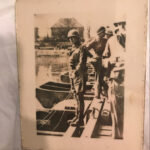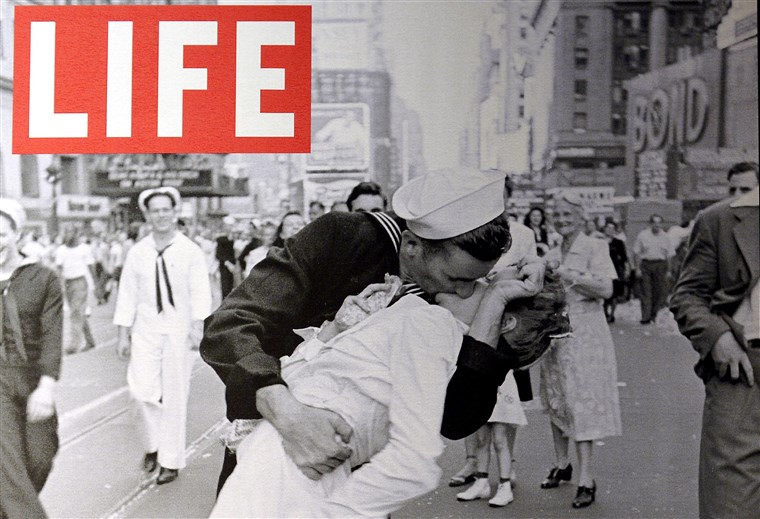“I don’t think the camera lies.” Susan Sontag, writer.
“In one way or another, the camera always lies.” Norman Davies, historian.
“Under Stalin’s regime…photographs lied.” Stephen F. Cohen, historian.
“Photographs can’t do the moral or the intellectual work for us. But they can start us on our way.” Susan Sontag.
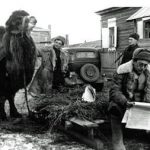 Kuznechik, a camel, followed the Red Army’s 308th Rifle Division from Stalingrad (1942/3) to Berlin (1945), according to A Writer at War, Vasily Grossman, by Antony Beevor.
Kuznechik, a camel, followed the Red Army’s 308th Rifle Division from Stalingrad (1942/3) to Berlin (1945), according to A Writer at War, Vasily Grossman, by Antony Beevor.
You Talking to Me?
 On April 1, 1933—only two months after Hitler became German Chancellor, and five years before Kristallnacht—the Nazis organized a nationwide boycott of Jewish businesses. And they made sure that shoppers got the message.
On April 1, 1933—only two months after Hitler became German Chancellor, and five years before Kristallnacht—the Nazis organized a nationwide boycott of Jewish businesses. And they made sure that shoppers got the message.
Read more
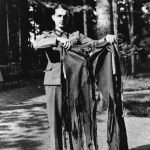
A solid wood table probably saved Hitler’s life on 20 June 1944 when Count Stauffenberg attempted to kill the Fuhrer with a bomb hidden in a briefcase.
Hitler’s trousers give some indication of the force of the blast.
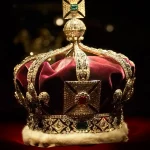 If you had one job, and that job was to safeguard the Crown Jewels from the Nazis, where (and how) would you hide the priceless gems?
If you had one job, and that job was to safeguard the Crown Jewels from the Nazis, where (and how) would you hide the priceless gems?
 American soldiers killed in battle were usually routinely buried with Christian gravestones—even if they were Jewish.
American soldiers killed in battle were usually routinely buried with Christian gravestones—even if they were Jewish.
Such mistakes are now being identified and corrected.
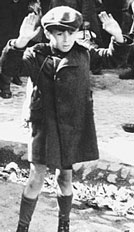 This haunting image of a boy too young to be a menace to anyone is familiar as a stand-alone portrait. However, it is actually part of a group shot portraying SS men as well as their Jewish prisoners in the Warsaw Ghetto.
This haunting image of a boy too young to be a menace to anyone is familiar as a stand-alone portrait. However, it is actually part of a group shot portraying SS men as well as their Jewish prisoners in the Warsaw Ghetto.
About a dozen individuals are potentially identifiable from the original photograph, and there are several candidates for the boy with his hands up. Only one person has been definitely identified in the larger group.
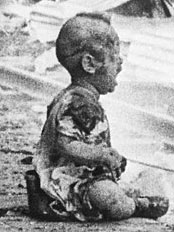 An infant—traumatized, possibly injured and abandoned—was one of many victims when Japanese bombers blasted Shanghai South train station to smithereens in August 1937. “Bloody Saturday.”
An infant—traumatized, possibly injured and abandoned—was one of many victims when Japanese bombers blasted Shanghai South train station to smithereens in August 1937. “Bloody Saturday.”
We know the photographer: H. S. Wong (a.k.a Wong Hai-Sheng, Wang Xiaoting and by his nickname “Newsreel”). The baby’s identity, and fate, is clouded by various competing narratives. Read more
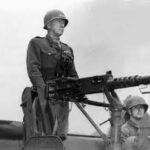 Before he reached the Rhine River in Germany, Patton bestrode the Seine in France and marked his territory: “Patton, after a flying visit, proudly announced to Bradley that he had ‘pissed in the river that morning.'” Antony Beevor, D-Day, quoting Martin Blumenson, ed., Patton Papers. See Patton Pis for more information.
Before he reached the Rhine River in Germany, Patton bestrode the Seine in France and marked his territory: “Patton, after a flying visit, proudly announced to Bradley that he had ‘pissed in the river that morning.'” Antony Beevor, D-Day, quoting Martin Blumenson, ed., Patton Papers. See Patton Pis for more information.
Patton Pis pix from a personal collection. For more information, see the comments at the bottom of Patton Pis.
Abandon ship! Carrying civilians in 1941, the Zamzam was attacked and disabled by Atlantis, a German raider. A cunning photographer led to eventual revenge.
The bathtub? Adolf Hitler’s.
The beauty in the tub? Lee Miller, an American-born model, artist, photographer, and wartime photojournalist for British Vogue.
VJ-Day—Victory over Japan.
The good news was so good that they sealed it with a kiss. But who is the kisser—and who is the kissee?
Direct Hit The Temple—one of four Inns of Court in London—is located between Fleet Street and the River Thames, bordering London’s financial district and the heavily Jewish East End: ideal targets for Luftwaffe bombers.
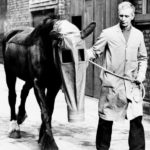 One Size Does Not Fit All During—and before—the war, gas masks were fitted to pets as well as to working animals.
One Size Does Not Fit All During—and before—the war, gas masks were fitted to pets as well as to working animals.
Memories of the gassing horrors from the First World War were still fresh. Read more
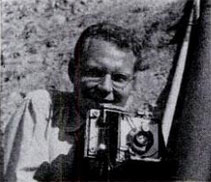 Dead Snakes Can Bite Life magazine photographer George Strock came perilously close to losing his life. He was saved in a manner that has become a Hollywood staple.
Dead Snakes Can Bite Life magazine photographer George Strock came perilously close to losing his life. He was saved in a manner that has become a Hollywood staple.
And after his lucky escape, he took the first published photo of dead American soldiers. Read more
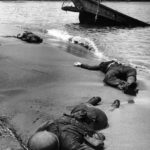 A Picture Too Far: Buna Beach and Censorship
A Picture Too Far: Buna Beach and Censorship
When American military censors received the first photographs of dead Americans at Buna Beach, they worried that publication would be too upsetting for the general public. The photos were censored.
President Franklin Delano Roosevelt finally approved publication—several months later. Read more
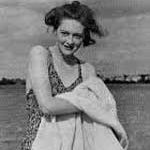 Phony War
Phony War
When British Major William Martin’s body washed up near Spain in 1943, the Germans obtained a snap of his fiancée Pam - and Allied invasion plans. The Germans were delighted. So were the Allies. Read more
 Dancing for Joy?
Dancing for Joy?
Belgium. Nazi HQ, June 17, 1940. Germany overwhelmed France, and Hitler did a Chaplinesque two-step. Never happened. Probably! Read more
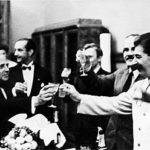 Stalin’s Jewish Ears - A Smoking Gun?
Stalin’s Jewish Ears - A Smoking Gun?
Was Stalin Jewish? Hitler had suspicions - and theories, one of which was that Jews had, well, Jewish ears. To see for himself, the German leader ordered a headshot of his Soviet counterpart. Read more
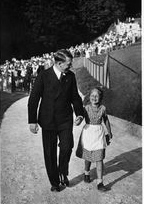 Bernhardine Nienau, Chosen by Hitler
Bernhardine Nienau, Chosen by Hitler
For several years before the war, Hitler entertained little Bernile at the Berghof. When her Jewish ancestry was uncovered, he unfriended her. Reluctantly. Read more
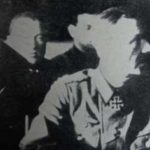 Real or 1943 ‘Photoshop’?
Real or 1943 ‘Photoshop’?
Was this photograph genuine? Hitler had his doubts. Friedrich Paulus, head of the Sixth Army in Stalingrad, was actually a Field Marshal—and German Field Marshals preferred suicide to surrender. At least, they were supposed to.
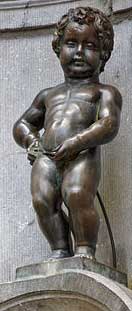 Patton Pissing in the Rhine?
Patton Pissing in the Rhine?
George S. Patton crossed the Rhine in March 1945 at Oppenheim, south of Frankfurt. While still on the pontoon bridge, the irrepressible American general heard the call of nature - and answered it.
And he was supposedly photographed doing so. Read more
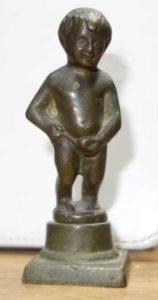 Winnie’s Tinkle
Winnie’s Tinkle
In early March 1945, with the Germans in retreat, it was the snappers who had to hold it in when British Prime Minister Winston Churchill approached the Siegfried Line and relieved himself. Photographers had to exercise self-control. Read more
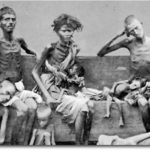 Bengal Famine
Bengal Famine
In India as in Leningrad and Auschwitz and many other locations during the war, starvation claimed millions of victims, turning people into living skeletons before they died. Read more
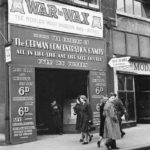 Concentration Camps Cost Extra
Concentration Camps Cost Extra
A London wax museum mounted this extraordinary exhibition several months before Germany surrendered—and before Auschwitz was liberated. Read more
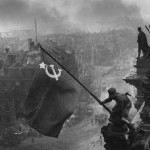 The Reichstag Red Flag: Faked?
The Reichstag Red Flag: Faked?
Staged? Faked? Like Joe Rosenthal’s famous Iwo Jima image that inspired him, Evgeny Khaldei’s dramatic photograph attracted controversy - and still appears in different versions. Read more
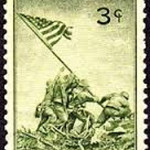 Iwo Jima! Staged?
Iwo Jima! Staged?
Six soldiers raised the flag, photographer Joe Rosenthal took his shot, his photo quickly became a phenomenon - and he was accused of staging the whole thing. Read more
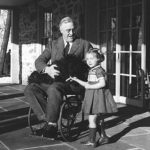 FDR’s Wheelchair
FDR’s Wheelchair
Seated. At his White House desk, or in a car, or in an armchair. Or standing, his arm linked for support by his son or another aide. America’s 32nd president never posed in a wheelchair - - almost never. Read more
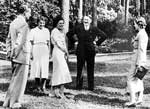 The Minister Vanishes
The Minister Vanishes
The gap is intriguing: in this small intimate gathering, someone should be on Hitler’s left. Someone was. Read more
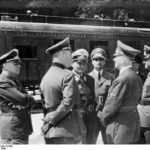 Location, location, location.
Location, location, location.
When France surrendered to Germany in June 1940, Hitler wanted to rub their noses in it. An old railway carriage did the trick. Read more
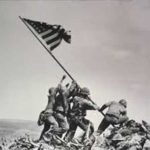 Iwo’s Sixth Man
Iwo’s Sixth Man
In 2016 - nearly 70 years after the fact - the Marine Corp concluded that Navy Corpsman John Bradley was not actually one of the six flag raisers. Alas, Bradley was the best known member of the group. Read more
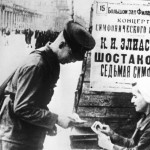 Shostakovich’s Starvation Symphony
Shostakovich’s Starvation Symphony
A Red Army soldier purchases a ticket for the historic - in some ways, miraculous - performance of Shostakovich’s Seventh - the “Leningrad.” At the time, cats - being edible - were more valuable than roubles. Read more
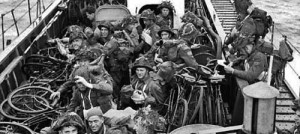 D-Day’s Wheels
D-Day’s Wheels
Landing craft for Operation Overlord carried troops, tanks, guns, trucks, jeeps. and-bicycles and spare tires and wheels. Read more
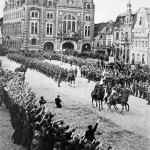 Into the Rhineland
Into the Rhineland
German troops remilitarized the Rhineland on 7 March 1936, an act of military bravado that was just that - an act. Hitler took a big gamble. He won.
Read more
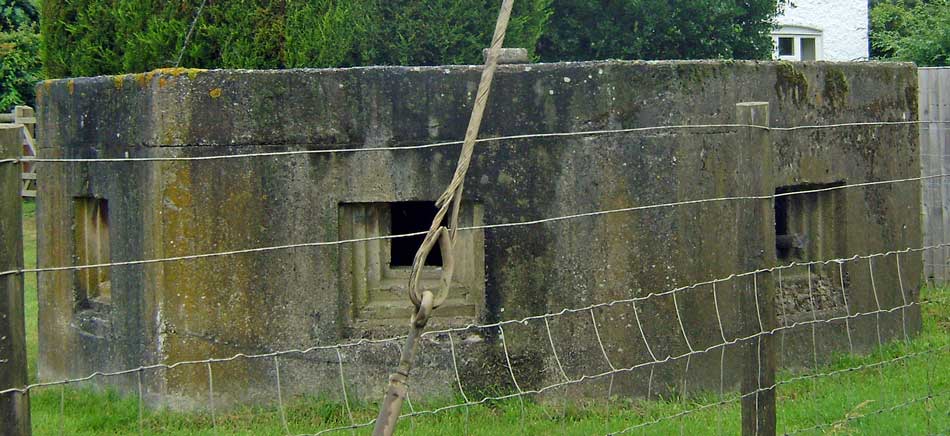 Wartime Pillboxes, Peacetime Britain
Wartime Pillboxes, Peacetime Britain
Built to withstand the ravages of war, concrete pillboxes also defy time. Many are still standing. Read more
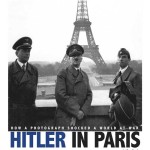 Hitler in Paris (1)
Hitler in Paris (1)
This photograph “shocked the world”, according to the small print above the title of this slim volume by Don Nardo. As well it might: Hitler in Paris was the mother of all photo ops. Read more
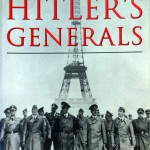 Hitler in Paris (2)
Hitler in Paris (2)
If they look, smell and waddle like generals, they must be generals - unless they are architects and sculptors and who knows what else. Read more
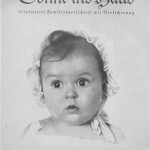 Hessy Taft: Perfect Aryan Child!
Hessy Taft: Perfect Aryan Child!
When Hessy Levinson was chosen (possibly by Josef Goebbels) as Germany’s most beautiful Aryan child, her parents were more scared than proud. This beauty queen was a time bomb. Read more
